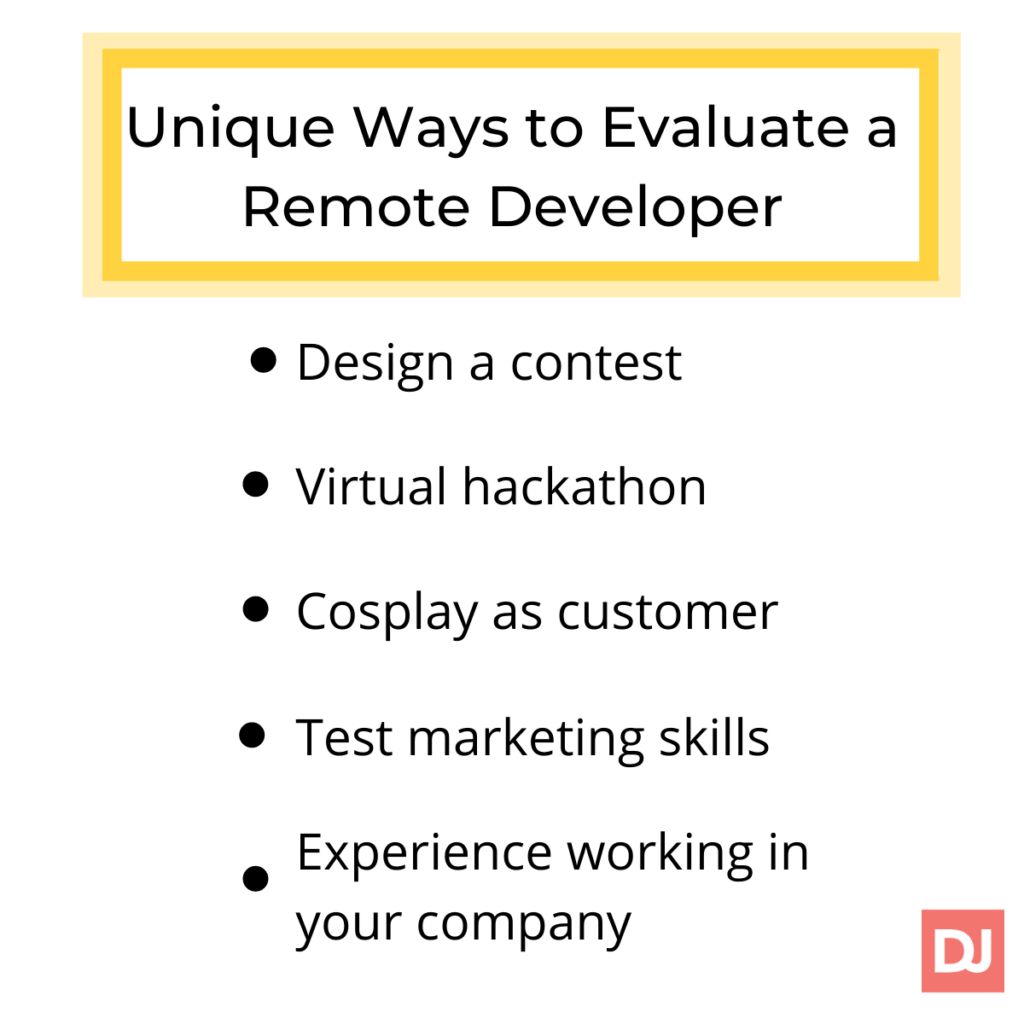Measuring the technical aptitude of a remote web developer has been a controversial topic because the information HR managers usually gather about their skills is secondhand. Resumes, referrals, portfolios – can be impressive. However, you still want to test their technical competence before hiring your next developer. One way we at DistantJob find that out is by looking at what the candidates are doing currently. And by selecting from a pool of already-working, experienced developers. If that’s your type, call us now.
Making applicants code in front of prospective employers is nerve-wracking. You can miss out on the potentially-better developer who suffers from performance anxiety.
So, it’s much better to evaluate them in their…erm, natural habitat. Breaking down the formalities and gamification of the interview process will bring you closer to the creative and expert candidate.
How to Evaluate Remote Employees
Here are 5 unique ways you can evaluate your remote web developers through the different stages of the hiring process.

1. Design contest on your careers page
Is your Career page a run-of-the-mill application form? Does it ask the usual questions about skills and experience? How about a contest instead?
A contest where you invite applicants to design a new product/feature could have many benefits:
- From the get-go you get to see the applicants’ tech skills in action
- If you place job adverts, a design contest would be a catchy way to attract developers
- It’ll make sure the candidates know your company well if they are to design a relevant new product/feature
- You can narrow down your applicant list rapidly
When you start with a narrower, more qualified group of candidates, your recruitment process can also be cut short.
2. Host a virtual hackathon
Hackathons to developers are akin to social gatherings for “other” people. Getting a group of pre-qualified candidates to solve a problem together is a great way to find your next remote developer.
A hackathon would be an awesome way to:
- Get a group of unknown individuals from all over the world to collaborate – the very essence of remote work
- Good way to disarm social awkwardness, interview anxiety, and other maladies that ail developers, and focus on their tech skills
- Find out which of your prospective candidates is good with which aspect of developing
- Gauge their creative and analytical skills
- Tailor the problem to fit the kind of projects your company handles – so you get a clearer picture of how a prospective candidate may perform at work
- The rules of the hackathon are like client briefs – and how they interpret them can further narrow your qualified candidate list
A hackathon is an incubator for raw, unadulterated ideas. Using it as a part of your recruitment process means you get to work with people who can come up with and execute such original ideas.
3. Cosplay as customer
Costume optional.
If the next iteration is what makes a good product, then your candidates should be able to build the subsequent prototype. Give your chosen candidates some customer feedback about your current product, significant metrics, and an idea about the product’s market. And ask them to prototype the next version of the product.
This exercise can help test a myriad of skills:
- See how they analyze the metrics and client feedback from past iterations of your product
- Know how they would prioritize the metrics, which ones they’d optimize, and how they’d trade off
- Find out if they can build a rough but functional prototype on-the-go
- Demonstrate how well they truly understand your product and the kind of contributions they can actually make
If you believe your product should be useful to your end-users, then you’d want your developers to understand the customers’ perspectives. It’s a skill few developers possess and one you can test for when using this method.
4. Test technical marketing skills
Getting your products to market is a common goal to all businesses. A developer needs to have an understanding of the product’s market and the end-users.
Asking your remote candidates to come up with a strategy to sell your product to another business would be a great way to:
- See if they have a basic understanding of both your market and your customers’ needs
- Figure out if they can speak fluently about your product in technical terms with the intention to sell
- Find out if they know the basics of digital, print, and event marketing
Developers don’t solely write code. This is a great process to evaluate remote developers and see if they have clarity about how the product will be used and by whom.
5. Experience a day of working at your company
Although not unheard of, for remote teams this may not be an option that jumps to mind.
But even a virtual day-at-work in your company can help you see whether the candidate would be a good fit for the following reasons:
- Candidates get to experience the pace of work at your company, and you can find out whether they can keep up
- They can see how your remote meetings work – and they can specifically be asked to contribute
- They can work with another developer for the day and contribute to the actual coding
- Candidates can interact with other team members, whose opinions can help you decide between your top choices
If you’ve ever put any importance on remote work culture (as you should), this method of evaluation is worth trying when you finalize your candidate list.
Final Word on Evaluating Remote Developers
There are many other ways to evaluate remote developers, like analog gamification, mob programming, and writing test case scenarios. But whichever methods you use, it’s essential to look at a developer’s programming skills from as many aspects as possible – not just coding.
That’s why the evaluation by coding tests doesn’t always give appropriate results. In contrast, the above methods take a more holistic view of the developer’s technical skills. However, finding the best way to evaluate remote employees depends on your company’s priorities and the type of employee you are seeking.
We know that building a process to evaluate remote developers might be time-consuming. Therefore, with our unique recruiting method, we have helped many companies around the world for the last 10 years to hire full-time remote software developers in less than two weeks.




